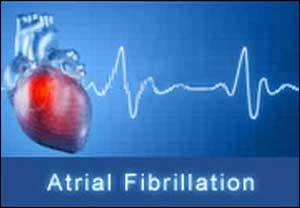- Home
- Editorial
- News
- Practice Guidelines
- Anesthesiology Guidelines
- Cancer Guidelines
- Cardiac Sciences Guidelines
- Critical Care Guidelines
- Dentistry Guidelines
- Dermatology Guidelines
- Diabetes and Endo Guidelines
- Diagnostics Guidelines
- ENT Guidelines
- Featured Practice Guidelines
- Gastroenterology Guidelines
- Geriatrics Guidelines
- Medicine Guidelines
- Nephrology Guidelines
- Neurosciences Guidelines
- Obs and Gynae Guidelines
- Ophthalmology Guidelines
- Orthopaedics Guidelines
- Paediatrics Guidelines
- Psychiatry Guidelines
- Pulmonology Guidelines
- Radiology Guidelines
- Surgery Guidelines
- Urology Guidelines
Updated ACC/AHA Guideline for management of atrial fibrillation

USA: The American College of Cardiology/American Heart Association (ACC/AHA) and the Heart Rhythm Society (HRS) have released an updated version of the 2014 guidelines for the management of patients with atrial fibrillation (AF).
The scope of this focused update includes revisions to the section on anticoagulation (because of the approval of new medications and thromboembolism protection devices), revisions to the section on catheter ablation of atrial fibrillation (AF), revisions to the section on the management of AF complicating acute coronary syndrome (ACS), and new sections on device detection of AF and weight loss.
KEY RECOMMENDATIONS
Selecting an Anticoagulant Regimen
- For patients with AF and an elevated CHA2DS2-VASc (congestive heart failure, hypertension, age ≥75 years [doubled], diabetes mellitus, prior stroke or transient ischemic attack or thromboembolism [doubled], vascular disease, age 65-74 years, sex category) score of 2 or greater in men or 3 or greater in women, oral anticoagulants are recommended.
- Female sex, in the absence of other AF risk factors (CHA2DS2-VASc score of 0 in males and 1 in females), carries a low stroke risk that is similar to males. Adding female sex to the CHA2DS2-VASc score matters for age >65 years or ≥2 non–sex-related stroke risk factors.
- Non-vitamin K oral anticoagulants (NOACs) (dabigatran, rivaroxaban, apixaban, and edoxaban) are recommended over warfarin in NOAC-eligible patients with AF (except those with moderate-to-severe mitral stenosis or a mechanical heart valve).
- In patients with AF (except those with moderate-to-severe mitral stenosis or a mechanical heart valve), the CHA2DS2-VASc score is recommended for assessment of stroke risk.
- For patients with AF who have mechanical heart valves, warfarin is recommended.
- Renal and hepatic function should be evaluated before initiation of a NOAC, and both should be reevaluated at least annually.
- Aspirin is no longer recommended for patients with low CHA2DS2-VASc scores. For patients with AF (except those with moderate-to-severe mitral stenosis or a mechanical heart valve) and a CHA2DS2-VASc score of 1 in men or 2 in women, clinicians may consider prescribing an oral anticoagulant to reduce the risk of thromboembolic stroke.
Interruption and Bridging Anticoagulation
- Idarucizumab is recommended for dabigatran reversal in the event of life-threatening bleeding or an urgent procedure.
- Andexanet alfa can be useful for rivaroxaban and apixaban reversal in the event of life-threatening or uncontrolled bleeding.
Percutaneous Approaches to Occlude the LAA
- Percutaneous left atrial appendage (LAA) occlusion may be considered in patients with AF at an increased risk of stroke who have contraindications to long-term anticoagulation.
Prevention of Thromboembolism
- For patients with AF or atrial flutter of at least 48 hours, or when the AF duration is unknown, anticoagulation with warfarin (international normalized ratio [INR] 2.0-3.0), a factor Xa inhibitor, or direct thrombin inhibitor is recommended for at least 3 weeks before and at least 4 weeks after cardioversion, regardless of the CHA2DS2-VASc score or the method (electrical or pharmacologic) used to restore sinus rhythm.
Catheter Ablation in HF
- AF catheter ablation may be reasonable in selected patients with symptomatic AF and heart failure (HF) with reduced left ventricular (LV) ejection fraction (HFrEF) to potentially lower the mortality rate and reduce hospitalization for HF.
AF Complication ACS
- In patients with AF at increased risk of stroke (based on CHA2DS2-VASc risk score of ≥2) who have undergone percutaneous coronary intervention (PCI) with stenting for acute coronary syndrome (ACS), the following is reasonable to reduce the risk of bleeding as compared with triple therapy (oral anticoagulant, aspirin, and P2Y12 inhibitor):
- Double therapy with a P2Y12 inhibitor (clopidogrel or ticagrelor) and dose-adjusted vitamin K antagonist.
- Double therapy with P2Y12 inhibitors (clopidogrel) and low-dose rivaroxaban 15 mg daily.
- Double therapy with a P2Y12 inhibitor (clopidogrel) and dabigatran 150 mg twice daily.
- If triple therapy is prescribed for patients with AF who are at an increased risk of stroke (based on CHA2DS2-VASc risk score of ≥2) and who have undergone PCI with stenting (drug-eluting or bare metal) for ACS, clinicians may consider a transition to double therapy (oral anticoagulant and P2Y12 inhibitor) at 4-6 weeks.
Weight Loss in Patients with AF
- For overweight and obese patients with AF, weight loss, combined with risk factor modification, is recommended.
For detailed recommendations log on to https://doi.org/10.1161/CIR.0000000000000665 and 10.1016/j.jacc.2019.01.011

Disclaimer: This site is primarily intended for healthcare professionals. Any content/information on this website does not replace the advice of medical and/or health professionals and should not be construed as medical/diagnostic advice/endorsement or prescription. Use of this site is subject to our terms of use, privacy policy, advertisement policy. © 2020 Minerva Medical Treatment Pvt Ltd